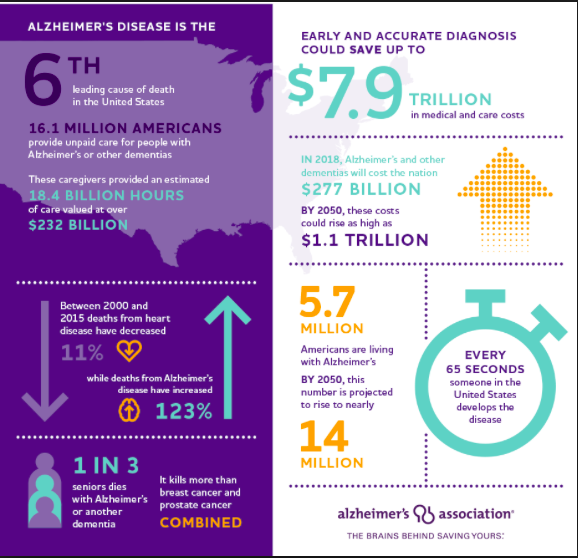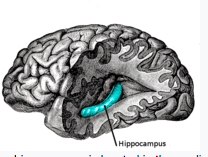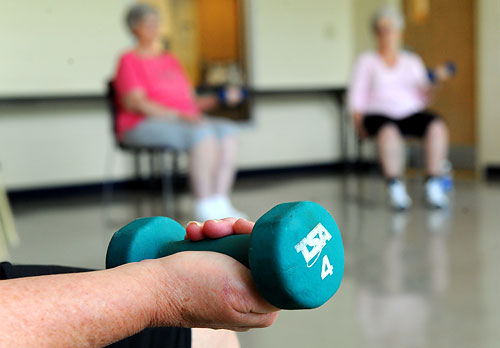Want to know why you want to prevent Alzheimer's? Take a look at this video:
The statistics and forecasts for how many people will suffer from Alzheimer's are staggering. Take a look at these facts from the Alzheimer's Foundation of America. As a nation we need to find ways to prevent Alzheimer's. Or at least slow it down:

We see it every day in our assisted living homes. At A Paradise for Parents, about 2/3 of our residents suffer from some form of Dementia or Alzheimer's. In fact, we have one home that specializes in memory care.
We want to do everything we can to help families cope with this horrible condition. We've compiled 23 things you can do to lower your chances, or hopefully prevent Alzheimer's.
If you have a family member already suffering from Alzheimer's, many of these techniques will also help slow it down.
Dietary Methods to Prevent Alzheimer's
The number 1 form of Alzheimer's prevention seems to be diet. Here are some choices you can make that can really help:
- Cut Out Carbohydrates - Although it seems very fashionable to say it these days, low-carb diets seem to make a big difference in preventing Alzheimer's. According to Dr. David Perlmutter, author of the NY Times best seller, Grain Brain:
"[Alzheimer's] is a preventable disease. It surprises me at my core that no one's talking about the fact that so many of these devastating neurological problems are, in fact, modifiable based upon lifestyle choices… What we've crystallized it down to now, in essence, is that diets that are high in sugar and carbohydrates, and similarly diets that are low in fat, are devastating to the brain.When you have a diet that has carbohydrates in it, you are paving the way for Alzheimer's disease. I want to be super clear about that. Dietary carbohydrates lead to Alzheimer's disease. It's a pretty profound statement, but it's empowering nonetheless when we realize that we control our diet. We control our choices, whether to favor fat or carbohydrates."

- Cut Out Sugar - I'm sure a lot of people don't want to hear this one. That's because so many of us are addicted to sugar. Yet at least one study of 5,189 people over 10 years showed higher sugar is directly correlated to higher rates of cognitive decline.
- Stop Eating for Certain Periods - The cool kids call it 'intermittent fasting'. Try skipping a meal every so often. If you eat lunch around noon, don't eat again until breakfast the next morning. There's a reason they call it 'break - fast'.
Fasting causes your body to stop burning carbs and start burning fat. In one study, they found burning fat helps to lessen the Amyloid-Beta plaque build up in your brain that contributes to Alzheimer's. - Eat Lots of Saturated Fats - People used to think all fats are bad for you. Now we are learning how important saturated fats can be for brain health. This doesn't mean eat a lot of meat. It means eating foods such as the ones below:
- Avocados
- Coconuts and coconut oil
- Unheated organic nut oils
- Raw nuts such as pecan and macadamia
You can see a summary of all the studies linking saturated fat to brain health here:
- Avoid Trans Fats - Foods such as margarines, vegetable oil, canola oil, corn oil, and butter-like spreads are full of trans fats. So are most processed foods. A lot of these fats are associated with higher levels of cholesterol. A study of 444 Finnish men found that higher cholesterol tripled your risk of Alzheimer's.
- Eat Coconut and MCT Oil - Dr. Mary Newport was trained in Pediatrics and Neonatology (care of newborns). Then her husband started showing signs of Alzheimer's. She suddenly had to become an expert in older people.
When she researched the latest Alzheimer's medicine, she found many of the them contained a similar ingredient, medium-chain triglycerides (MCT). That same ingredient could be found in coconut and, you guessed it, MCT oil. So she started feeding coconut oil to her husband multiple times a day. The result? A dramatic reduction of her husband's symptoms. It is thought that coconut and MCT oils work so well because the body can instantly make ketones out of them. The Ketones can penetrate the Amyloid-Beta plaques in the brain and provide energy to the cells.
- Eat Less Meat - One theory about Alzheimer's is that too much iron in the brain causes oxidative stress and destroys nerve cells. Researchers from the Semel Institute for Neuroscience and Human Behavior at UCLA reported their study in the Journal of Alzheimer's Disease. They found that iron build up in the hippocampus (part of the brain associated with emotion and learning) happened early on in Alzheimer's patients.

The author's concluded:
"The data shows that in AD, Hipp damage occurs in conjunction with ferritin iron accumulation. Prospective studies are needed to evaluate how increasing iron levels may influence the trajectory of tissue damage and cognitive and pathologic manifestations of AD."
- Eat Lots of Vegetables - The Baltimore Longitudinal Study of Aging performed a study with 579 elderly, non-dementia volunteers over 9.3 years. Those who had greater intakes of Folates, Vitamin E and Vitamin B6 had a much decreased risk of Alzheimer's. All of those vitamins are found in green, leafy vegetables.

Avoid Folate supplements which do not help with your risk factors for Alzheimer's nearly as much.
How Exercise Can Help Prevent Alzheimer's
Disclaimer: Make sure to check with your Doctor before beginning any workout program - especially if you are older or haven't exercised in a while.
Just like a good diet, everyone knows that exercise is good for you. However researchers are finding that exercise specifically helps prevent brain problems.
How? Exercise affects three main chemicals involved in keeping you mentally sharp. The links are to pretty technical articles. I'm not sure if you want to read them. They just back up the claims I'm making with Science:
- Brain Derived Neurotropic Factor (BDNF) - A chemical in the brain that participates in neuroplasticity - a fancy way of saying how the brain creates new connections, as in when the brain is learning something new. Alzheimer's causes a big drop in neuroplasticity.
- Peroxisome Proliferator-activated receptor Gamma coactivator (PGC-1α) - PGC-1α helps the mitochondria in your cells recreate themselves. Mitochondria are the batteries for your cells and create energy. The biggest concentration of mitochondria are in your brain. As you age, the mitochondria take a beating. The lower energy means your cells don't function as well. PGC-1α will slow this process
- Cytochrome C Oxidase (CCO) - Similar to PGC-1α, CCO helps to improve energy production in the mitochondria. Unlike the first two chemicals which are greatly enhanced through exercise, CCO is enhanced through sun exposure. Vitamin D really helps your body produce CCO, and the best source of Vitamin D is the sun. So it just makes sense to get outside and exercise!
Types of Exercises to Prevent Alzheimer's
Turns out practically any type of exercise helps prevent Alzheimer's. Let's continue our list of ways to prevent Alzheimer's with a few different types:
- Aerobic Exercise - Turns out any type of aerobic exercise can help stimulate your body to make more BDNF and PGC-1α. And it's the easiest type to do outside where you can build up more CCO. Some examples could be as simple as:
- Walking
- Gardening
- Swim
- Bike
- Jog
- Work on a project around the house
- Weightlifting - Researchers at the University of British Columbia in Vancouver studied women between the ages of 70 to 80. Everyone in the group had some form of memory loss. The researchers assigned the women to one of three groups:
- Resistance training
- Aerobic training or
- Balance-and-tone training.
- Aerobic Exercise - Turns out any type of aerobic exercise can help stimulate your body to make more BDNF and PGC-1α. And it's the easiest type to do outside where you can build up more CCO. Some examples could be as simple as:
In each program, participants exercised two times a week for six months. At the end of the study period, those who had participated in strength training fared best: they outperformed the other groups on tests measuring attention, memory and higher-order brain functions like conflict resolution. They also showed increased function in three brain regions involved in memory.
- High Intensity Exercise - Anaerobic exercise such as sprinting (either on foot, on a bike or in a pool) can help the function of your hippocampus (see above about the hippocampus). It also improves your high-interference memory. That's the part of your memory that helps you pick out details. An example would be picking out your car from a parking lot full of similar makes and models.
High-Intensity workouts sound like something for the much younger generation. They don't have to be. Just push yourself to go as fast as you can (15-30 for short-periods) of time. Here are some 100+ year-olds competing in the 100-yard dash:
- https://www.youtube.com/watch?v=tOzCoDvRqyk
Supplements to Prevent Alzheimer's
Eating well is probably the best way to prevent Alzheimer's, but sometimes it's difficult to make sure we receive all the nutrients we need. Supplements are called supplements for a reason. They can really help in our war with disease.
Here are some supplements that can really make a difference in brain health:
- Sulfurophane - This compound can be found in broccoli and other cruciferous vegetables. The trouble is you have to cook the broccoli just right. You must also not freeze it and prepare it properly to gain the full benefits. A Sulfurophane supplement may be a whole lot easier.
Studies show Sulfurophane has reduced the Amyloid Beta and Tau plaques in the brain. These two proteins that form plaques are one of the biggest issues with people who contract Alzheimers.- Gingko Biloba Extract - From the Gingko Biloba tree (surprise..surprise), this extract improves blood flow to the brain.
- Omega-3 fatty acids - These are antioxidants found primarily in organic, wild fish. Or fish oil or Krill Oil supplements. Like lots of antioxidants, Omega-3 reduces brain cell damage and helps prevent inflammation.
- Magnesium Glycinate - Magnesium plays a role in lots of functions in your body, especially those mitochondria we talked about in the exercise section. Many doctors think most of us are magnesium deficient. Here's a way to tell:
- Curcumin - This is a powerful antioxidant derived from the turmeric spice. Tumeric is the ingredient that gives curry its unique taste. However there is very little Curcumin in Tumeric. That's why it's important to take it as a supplement. Curcumin is incredibly protective of brain function.
Is it any wonder that the lowest rates of Alzheimer's in the world are in rural India, where curry is a staple of their diet?- Vitamin D - As I discussed up above int the Exercise section, Vitamin D is an anti-inflammatory vitamin that helps brain function significantly. Scientists have noted much larger incidences of Alzheimer's in Northern Climates than Southern. If you can't get out in the sun, take a supplement!
Other Ways to Prevent Alzheimer's
None of the remaining ways to prevent Alzheimer's in this article are that much less important than anything else. They just don't have enough sub-points to justify having their own section.
- Sleep - This one is HUGE! With our busy crazy days, it's difficult to get enough sleep. Yet a lack of sleep can make a big difference in your chances of contracting Alzheimer's.
When you sleep, your brain detoxifies and cleans itself through the Glymphatic System. It also goes through a process of 'synaptic pruning'. We learn and make lot of connections during the day. Sleep allows the brain to review the connections and remove the unnecessary ones. That way you don't overwhelm the brain.
Most doctors recommend at least 8 hours of sleep. Try to get as close to that number as you can.
- https://www.youtube.com/watch?v=pg_oSsPqyRc
- Reduce Stress - According to a study published at the World Congress of Neurology, too much stress causes:
A degenerative process in the brain and precipitate dysfunction in the neuroendocrine and immune system.- So many parts of our lives cause us to raise our stress levels. If you find yourself stressed out a lot, try something to alleviate it - Yoga, meditation, or just go for a walk and be thankful for all the beauty around you.

- But do something!
- Social Interaction - Hanging out with friends and staying social reduces your chance of contracting any of the diseases of old age. On the island of Ikaria, Greece, Alzheimer's and Dementia are virtually non-existent.

One of the attributes of these people is that they stroll into the town square after dinner each night and socialize. Yet in America 1 in 7 seniors live alone. Scientists believe that socializing builds stronger neural pathways in the brain.
- No Smoking - In this day and age it pretty much goes without saying that smoking is bad for you. Most people associate smoking with lung cancer - until recently. It looks like people who are heavy smokers, especially in their 50s and 60s, have twice as high a risk of Alzheimer's.

- Brush and Floss - Scientists have not established a proven link between gum disease and Alzheimer's. However, British scientists have found that gum disease bacteria disease in the brain's of Alzheimer's patients. Given that scientific links have been found between the bacteria and diseases like cancer, it seems entirely possible there is a link with Alzheimers.
- Try to Master Something - Working on improving your ability to speak a foreign language, play an instrument, or just learn a new skill on YouTube, will help maintain that neuroplasticity in the brain and decrease your risk.
Hopefully this helps. The key to preventing Alzheimer's is to START TODAY! The sooner you start working on this, the higher the chances are that you will be around mentally for the rest of your life!



